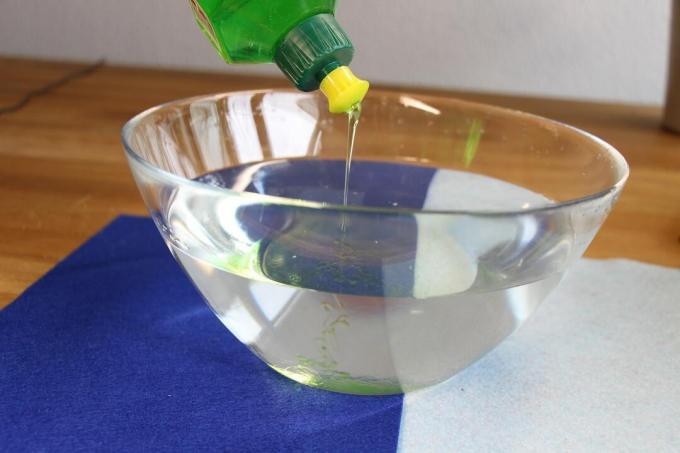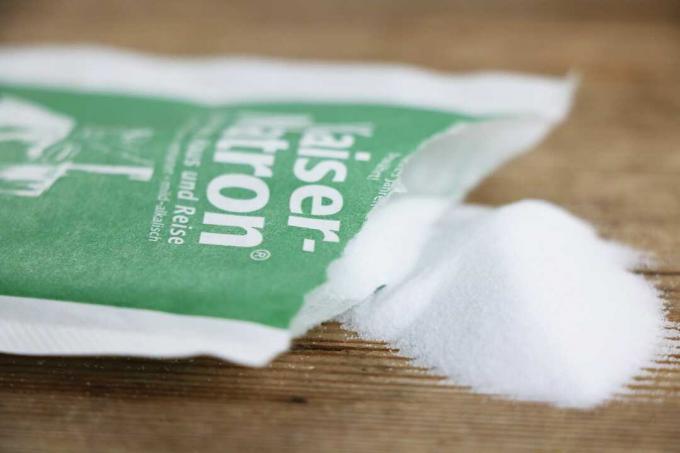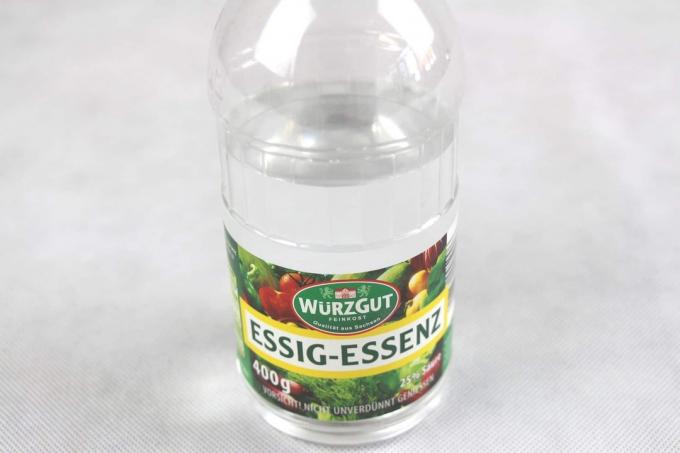
contents
- High-pressure cleaner damages concrete
- Home remedies for cleaning
- sand
- detergent
- soft soap
- curd soap
- washing soda
- starch and soda
- baking soda
- baking powder
- water
- frequently asked Questions
Dirt and discoloration on concrete surfaces in the garden and on the terrace are not uncommon after the winter. There are various ways to clean concrete slabs, although the high-pressure cleaner is not always recommended.
In a nutshell
- Concrete very absorbent
- High-pressure cleaner roughens the surface
- Impregnation of the concrete slabs makes sense
- clean with coarse sand
- other home remedies: soda, soft soap and Co.
High-pressure cleaner damages concrete
Concrete is a porous and therefore very absorbent material. For cleaning concrete slabs in the garden and on the terrace therefore only little water should be used. In the worst case, too much water, for example when using a high-pressure cleaner, can lead to the concrete slabs breaking open. Furthermore, the surface is roughened by the strong pressure. The result: Dirt can settle in the panels more quickly and easily in the future. If possible, the use of such cleaners should therefore be avoided. Alternatively, there are some home remedies for a gentler removal of dirt.
A notice: It makes sense to treat concrete slabs with a stone impregnator after laying. This lasts about three years and makes not only concrete slabs but also natural stone less sensitive to environmental influences and thus extends the service life.
Home remedies for cleaning
Various home remedies can be used to gently and often also permanently clean concrete surfaces. However, before these agents are used, the panels must be thoroughly swept with a broom.

Next to it is usually one grout cleaning necessary. Weeds and the like can be removed by hand or with a root brush. A wide variety of home remedies can then be used for cleaning:
Sother
Due to its abrasive effect, sand can be used to remove coarse dirt. At the same time, the surface is polished. The application is simple:
- Distribute sand generously over the surface
- sweep back and forth with a broom
detergent
For light soiling and discoloration, detergent is usually sufficient to clean concrete slabs. But use biodegradable agents for this.
- Dissolve some detergent in warm water
- pour over stone surface
- work in with a broom or scrubber
- then rinse with clear water

soft soap
Soft soap can also be used without hesitation. It is "organic" and inexpensive in drugstores.
- Dissolve some soft soap in lukewarm water
- spread on plates
- work in with a broom or scrubber
- Leave on for 20 minutes
- then rinse with clear water
curd soap
As an alternative to soft soap, conventional curd soap can also be used to clean concrete slabs. It is also very inexpensive and also very productive.
- scrape some soap off the block
- dissolve in lukewarm water
- Apply lye with a scrubber or brush
- Leave on for 15 minutes
- rinse with clear water

washing soda
The all-rounder is also good for cleaning concrete slabs. Soda is quite inexpensive. However, residues of the solution must not get onto lawns or beds.
- choose a sunny day
- Dissolve 100 g of soda in 10 liters of warm water
- apply to the surface with a rubber squeegee or broom
- Leave on for five to six hours
- rinse with clear water
A notice: It is advisable to wear gloves and safety goggles during use, as contact with the skin can cause irritation.
starch and soda
A mixture of cornstarch and soda has proven particularly useful for combating heavy soiling.
- Mix 4 tablespoons of cornstarch and 100 g of soda
- mix into a paste with 5 liters of warm water
- apply to surface
- work in with a brush or scrubber
- leave on for five hours
- rinse with clear water
baking soda
Baking soda not only removes dirt from concrete surfaces, it also brightens slabs that have darkened over time.
- Pour lukewarm water over plates
- sprinkle generously with baking soda
- work in with a brush or scrubber
- Leave on for 30 minutes
- rinse with clear water

baking powder
Of course, the probably most popular household remedy baking powder should not be missing. In addition to removing dirt, the treatment also brightens the plates a little.
- pour warm water over plates
- Sprinkle generously with baking powder
- Work into panels with a brush or scrubber
- Leave on for 30 minutes
- rinse with clear water
water
Sometimes just cleaning with clear water and a scrubber or brush helps.
- Pour a bucket of water over the surface
- alternatively spray with water hose
- remove dirt with a scrubber
- then rinse with clear water
Boiling water can be used for very stubborn dirt. After it has been spread on the plates, it should act for a few hours to loosen the dirt. Then simply scrub off the residue with a scrubber or broom.

A notice: Vinegar should not be used for cleaning. On the one hand, the acid it contains causes light spots to appear on calcareous tiles. On the other hand it is noisy Plant Protection Act prohibited, as the mixture enters the groundwater unfiltered.
frequently asked Questions
You should then use as little water as possible and also an attachment with rotating brushes. It is then handled like a vacuum cleaner. If there is no attachment, a distance of 30 centimeters between the plates and the spray can must be maintained. The angle is 45 degrees and the pressure must be set low. Care must be taken with the joints so that no rinsing occurs.
Sealing concrete surfaces makes them less susceptible to moisture, corrosion, UV rays, mechanical stress and chemical agents. In addition, it offers protection against dirt and the cleaning of such plates is less complex and easier. For example, stains caused by oils and fats can be prevented.
Chemical cleaning agents are not only harmful to the environment, but also to your own health and that of your pets. In general, the use of herbicides is prohibited on paved areas.



